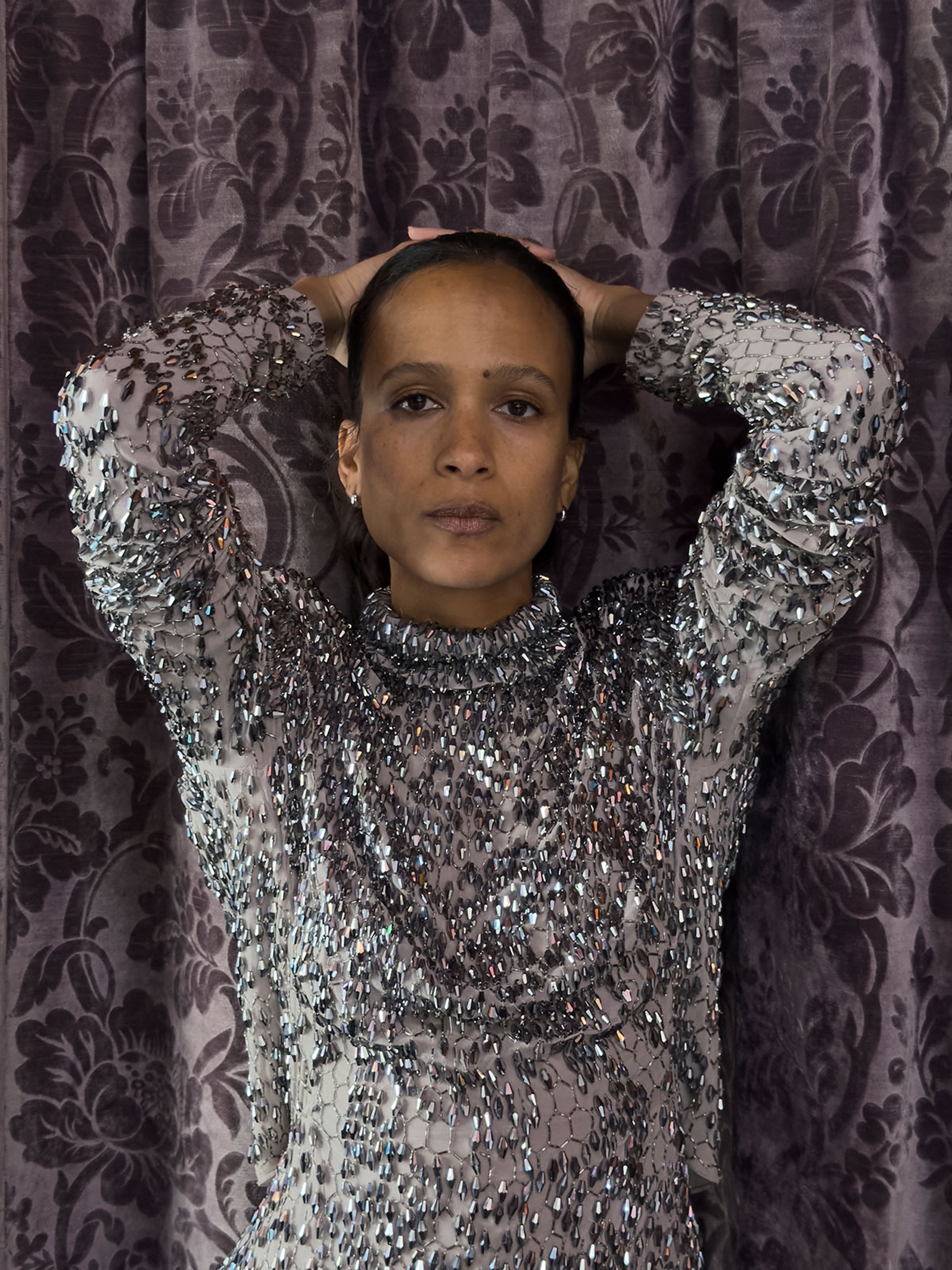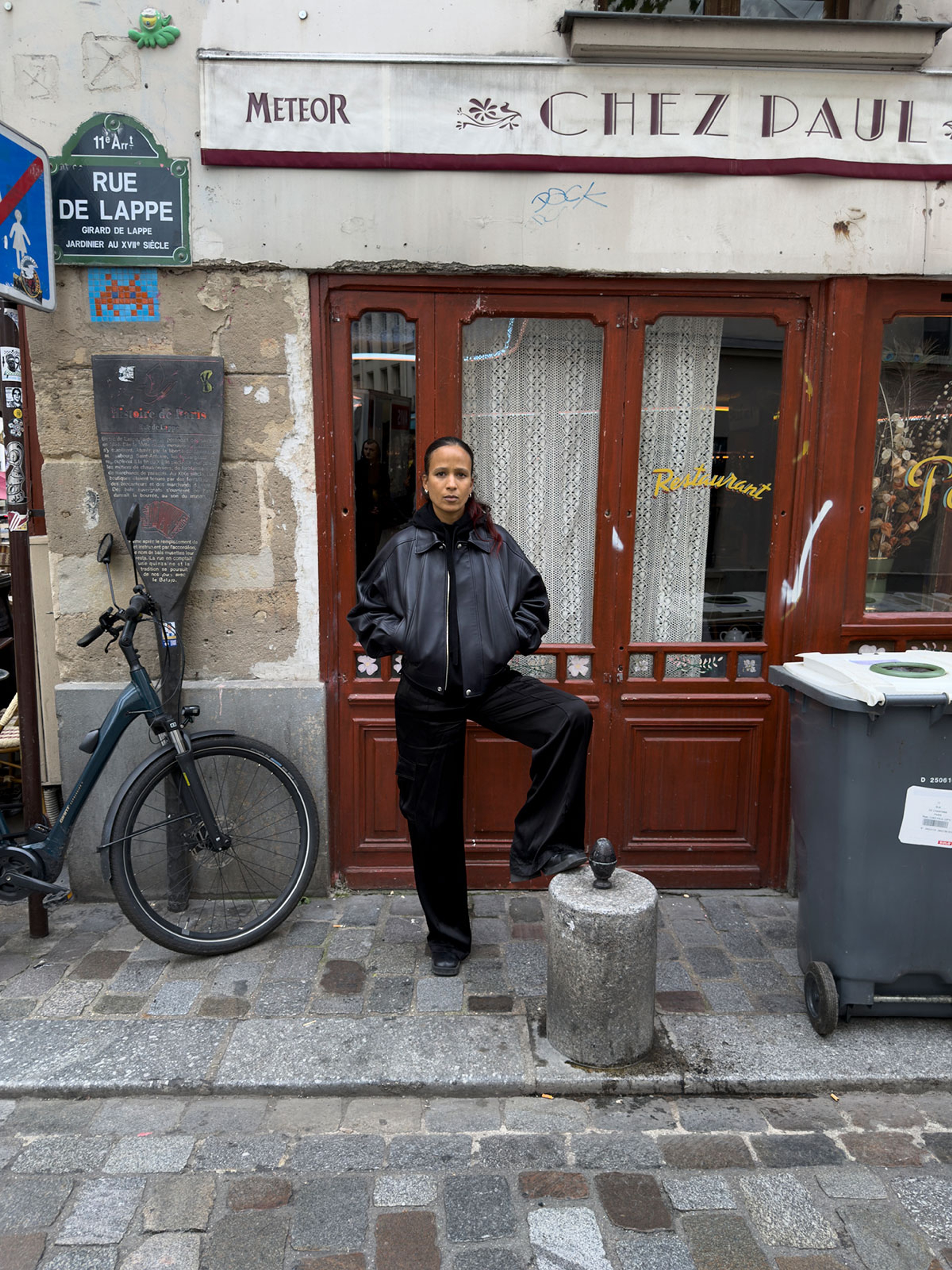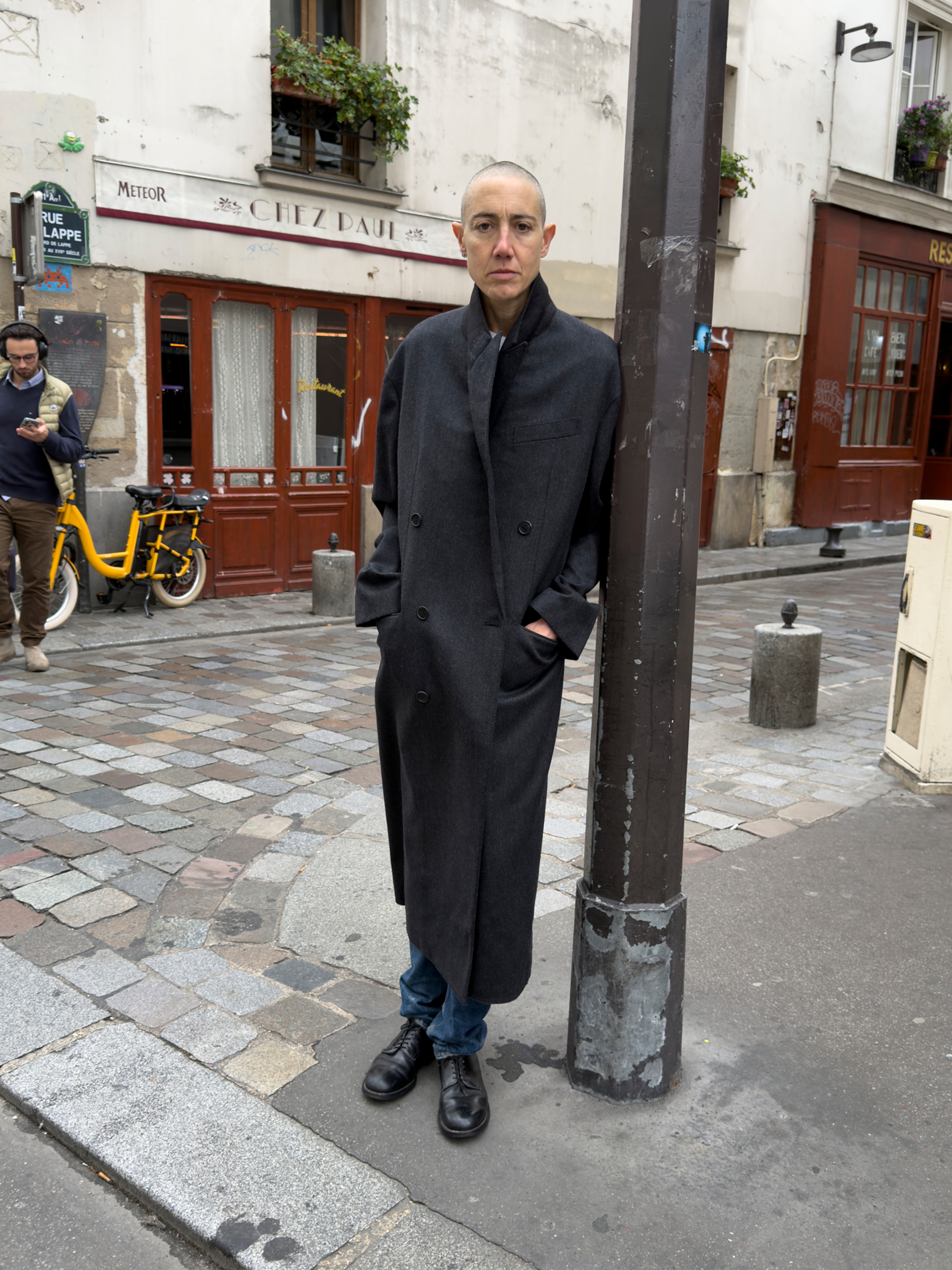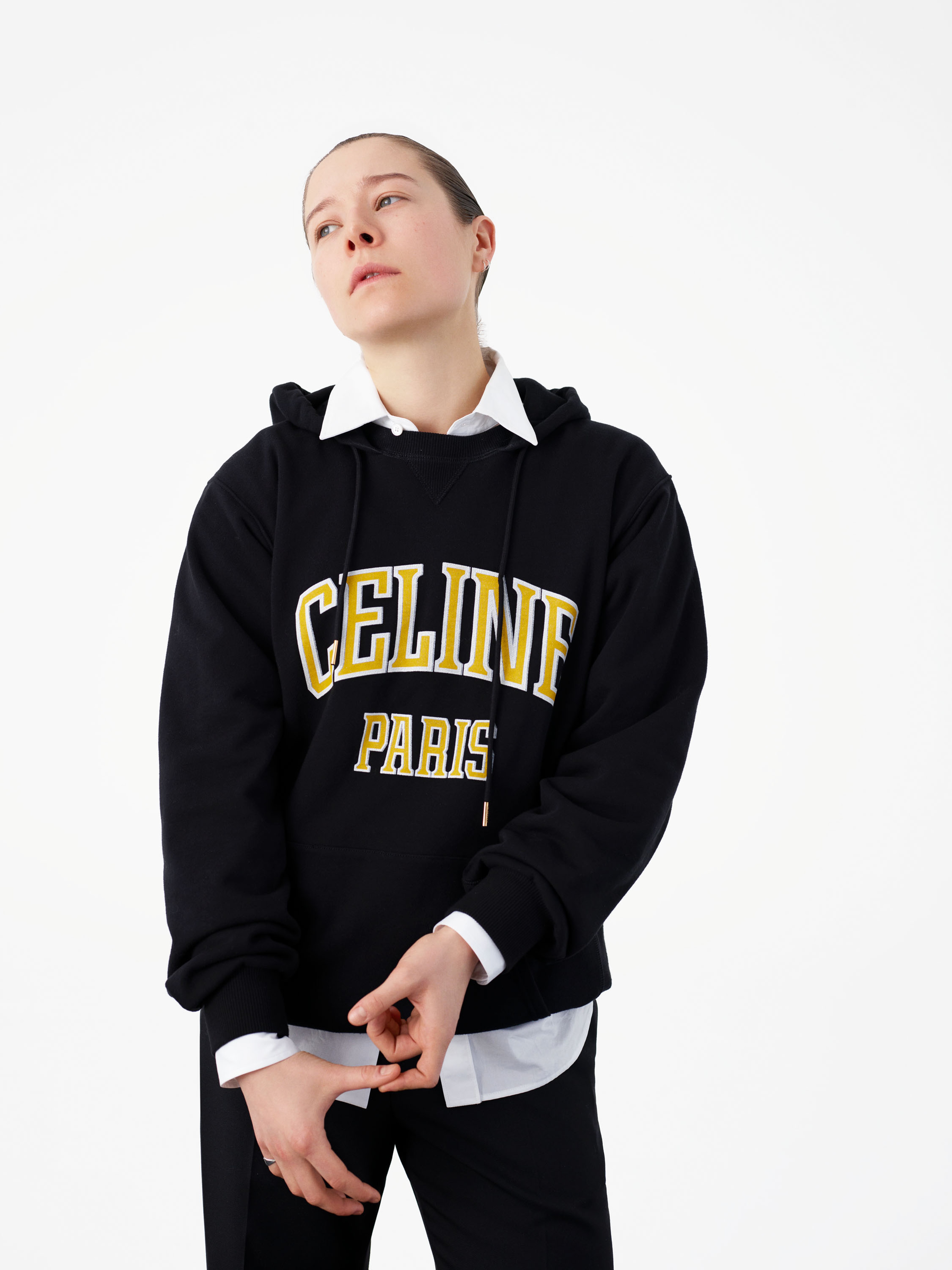Noise
ISSUE NO. 04: MATI DIOP

Mati wears dress, earrings and shoes by LANVIN.
SILVER TRACES
Words: 1837
Estimated reading time: 10M
Mati Diop’s films hinge on the spectral—her camera gravitating towards sparkling, slippery surfaces that reveal and conceal.
By Tia Glista
It is a fitting time to be discussing Mati Diop’s work, given her familiarity with the spectral: In October in Paris, where the filmmaker lives, silver gray clouds hover over the city like watching spirits. The air is chilled, the nights come sooner, and the veil between the living and the dead grows thin.
Mati’s first feature film, the Cannes Grand Prix runner-up Atlantics (2019), begins with the migration of a cohort of young men from Senegal to Spain—but when they are lost at sea, its focus turns to the women who are left behind and possessed by their spirits. Mati frames them through lacey curtains or in the shimmer of mirrors, evoking the ways they are haunted by this unresolved loss. At night, the ghosts shift from implied to manifest, as the women gather feverishly in the streets of Dakar, their eyes fogged over and pale, to occupy the home of the boss who withheld the men’s wages and catalyzed their emigration. When I first saw Atlantics at New York Film Festival, it was clear to me that this was the work of someone with an uncompromising vision. In the years since, Mati has maintained this autonomy and managed to avoid the franchise trap into which so many brilliant early-career women directors have been shoved; her work stands on its own, critical of the hegemonic systems that would absorb or dull its distinct edges.
Last February, Mati won the Golden Bear at Berlinale for Dahomey, an experimental documentary that maps the repatriation of 26 treasures pillaged by France in the 1890s on their journey back to Benin. The film is narrated by item “26,” who is reanimated through an echoey, oracular voiceover written by the Haitian poet Makenzy Orcel. 26 confesses: “My head is still assailed by the rattle of chains. I have in my mouth an aftertaste of the ocean. In several languages, these memories whisper in my ear the full weight of a past of which I am the trance, the trace.” The theft of artifacts is cleverly laminated with the theft of persons as the film meditates on histories of captivity, display, and extraction, quite literally speaking to what Aimé Césaire called the “thingification” of African bodies, by way of giving an object—once treated as a commodity—narrative agency.
Across both Atlantics and Dahomey, Mati’s work insists that the dead cannot rest as long as practices of looting, racial capitalism, slavery, genocide, and occupation remain unsettled, try as the West might to preemptively bury them. “The ghosts in my films are—above all—political,” Mati explains. “They come less from a pursuit of thrills than from an urgent need to create spaces where voices can be heard, memory can be restored, and justice can be served.” The dispossessed continue to haunt the present, overpowering a colonial ordering of the visible and invisible, or of space and time.
Critics have likewise located Mati in “in-between” spaces: documentary and fiction, social realism and the supernatural, homeland and diaspora, filmmaking and acting, France and Senegal. An early review of Atlantics in Film Comment characterized this “push-pull tension” and hybridity as the “one constant in Mati’s otherwise restless cinema.”
Her preoccupation with the revival of the past in the present—what psychoanalysts might call “the return of the repressed”—appears at both the level of the individual psyche and the political landscape more broadly. She has explored her own heritage, as the niece of iconic Senegalese filmmaker Djibril Diop Mambéty, in the short A Thousand Suns (2013), and imagined the diasporic longings of a French-Vietnamese director with the fictional Big in Vietnam (2012). During the pandemic, she made another short in her apartment for Miu Miu’s Women’s Tales series: In My Room (2020) is a poignant and playful document of lockdown set to recordings of her late grandmother telling stories about bygone decades. The short that means the most to Mati, however, is Atlantique (2008), which was shot in Dakar and eventually culminated in her first feature.
These projects are investigations into a labyrinthine search for origins, at turns elegiac, disoriented, defiant. Like Atlantics and Dahomey, they are often characterized by a general mood of unease, where history’s wake whips up an unremitting current: The women of Atlantics, for instance, spend much of the film waiting for men who will not return, or for a windfall that will not come. The last act of Dahomey is a debate among university students who wonder whether repatriation is a symbol of Benin’s sovereignty, or a disingenuous token from the West. Their future strains against the past that shapes it—a past that has, in mainstream cinema, mostly appeared through whispers, propaganda, and stereotypes.
“For as long as I can remember, I’ve experienced—from many different angles—omnipresent and enduring colonial scars,” says Mati. The filmmaker was born and raised in Paris, but has traveled regularly to Senegal since she was young. “In France, the colonial denial that’s so often discussed today wasn’t a topic at all when I was a child or a teenager. As a mixed-race child, I felt a deep loneliness in the face of this issue—one that had no name, yet was the elephant in the room.” Her investment in politics is therefore inseparable from her experience of film. Mati cites her uncle’s classic Touki Bouki (1973), along with the writings of James Baldwin, Maryse Condé, and Frantz Fanon, as guiding forces in the “powerful political compass” that orients her effort to “decolonize imaginaries by speaking about the world from a different axis of gravity than the West, creating spaces where African protagonists become the center of their own stories.”
This is not just a political intervention but an act of psychological survival: “I reached a point of saturation with a form of Western mental domination, and I could no longer bear to see our narratives, our stories, our Black faces disappear from the surface of the screen. That is the colonial project: to make us literally disappear in favor of their culture, their vision.” Mati references the genocide in Gaza as representing the “most radical form” of this mission today.
It seems inevitable, then, that although she began her career as an actress, Mati would seek a louder voice as a filmmaker. She made her screen debut in 2008’s 35 Shots of Rum, directed by Claire Denis, whose work remains a very apparent source of influence: Claire was raised in colonial French Africa and has returned repeatedly to the continent to examine the imprint of European occupation. Her 1999 masterpiece Beau Travail ends with an enigmatic dance sequence in a mirrored corner of a club, not unlike the climax of Atlantics, in which the protagonist Ada dances with the spirit of her lost lover Souleiman at a beachside bar, his body visible only in its mirrors.
Though Claire’s film could have established her as a household name in front of the camera, Mati was already thinking two steps ahead: “As a young mixed-race woman, I knew exactly what I would be facing: stereotypical roles, often imagined by white men with a rather questionable imagination. There was no way I was going to embody their exotic fantasies. To play that game would have meant to betray myself.” She has watched, too, as actresses have bravely come forward with accounts of ongoing sexual, physical, and emotional abuse in the film industry, dismayed but grateful that she charted a different path. Mati recalls stepping onto set for the first time as a director, on the rooftop of a building in Paris’s Marx Dormoy neighborhood. She self-financed the shoot with just a few hundred euros and enlisted friends to help; that day, at 24, she felt that she had finally found herself. “The only thing that could truly save me from the hell of Western dominance was to rewrite history myself—by picking up a camera and reclaiming the narrative.”
This mission has kept Mati busy, traveling between France, Senegal, and Benin as she made her first two features. She spent the last year touring Dahomey at festivals, museums, and university campuses worldwide. She thinks sometimes about moving closer to nature, settling down with “many dogs and a cat or two.” For now, however, she is at work writing her third feature, living in the Parisian high-rise where she shot In My Room. In that film, she dances around the kitchen at midnight in platform heels and a jaguar-print coat, a disco ball and strobe light set up next to the refrigerator; right now, she is wearing pajamas and watching the light on the Eastern horizon through her window.
Mati is drawn to these sparkling, slippery surfaces that reveal and conceal, that are fickle and irresolute: skies, mirrors, windows, shadows, clouds, and of course, the Atlantic Ocean. Such mediums conjure restless moods and offer hiding places for ghosts. When they unfold and divulge their secrets, they are quick to melt away again. But the message of Mati’s films remains—what is past, what is out of view, what is lost, is never really gone.

“The only thing that could truly save me from the hell of Western dominance was to rewrite history myself—by picking up a camera and reclaiming the narrative.”
EDITOR-IN-CHIEF
SARAH RICHARDSON
PHOTOGRAPHY
JUERGEN TELLER
CREATIVE PARTNER
Dovile Drizyte-Teller
TALENT
MATI DIOP
HAIR
Rudy Martins at Calliste Agency
MAKE-UP
Crystabel Efemena
TALENT DIRECTOR
TOM MACKLIN
PHOTO ASSISTANT
Julien Grignon
STYLIST ASSISTANTS
FEDERICO CANTARELLI, Apolline Coquet
HAIR ASSISTANTS
Elisa Lacroix, Megumi Sekine
MAKE-UP ASSISTANTS
Vladimir Gueye, Pauline Scannapieco
PRODUCTION
Cinq Étoiles Productions
Beyond Noise 2026
EDITOR-IN-CHIEF
SARAH RICHARDSON
PHOTOGRAPHY
JUERGEN TELLER
CREATIVE PARTNER
Dovile Drizyte-Teller
TALENT
MATI DIOP
HAIR
Rudy Martins at Calliste Agency
MAKE-UP
Crystabel Efemena
TALENT DIRECTOR
TOM MACKLIN
PHOTO ASSISTANT
Julien Grignon
STYLIST ASSISTANTS
FEDERICO CANTARELLI, Apolline Coquet
HAIR ASSISTANTS
Elisa Lacroix, Megumi Sekine
MAKE-UP ASSISTANTS
Vladimir Gueye, Pauline Scannapieco
PRODUCTION
Cinq Étoiles Productions
Beyond Noise 2026

